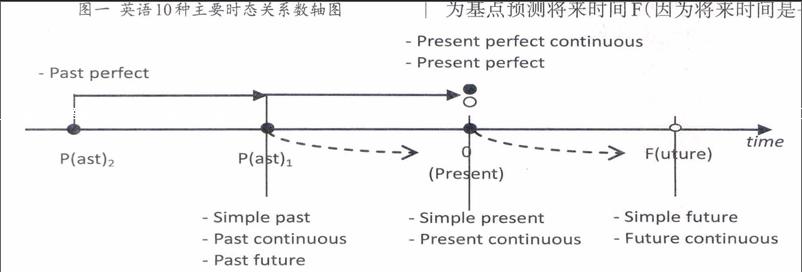高考时态和语态考点探析及备考建议
缪运霖

动词的时态和语态,对于中国英语学习者来说始终是一个难点,很多学习者熟记了相关的语法规则,在口头或书面表达时仍然晕头转向,难以把握。原因之一是,汉语思维中缺乏对等的概念,其时间概念是通过“着、了、过”等时态助词来表现的,而语态表现在汉语中则是区分“把”字句和“被”字句。在学习者语境意识尚不强的情况下,汉语思维强势介入,对英语产生干扰,形成了母语负迁移。因此,学习时要联系语境,从语境中找到指示语,处理时态及语态问题,从而提高自己的语法水平。
一、时态和语态学习的数轴法
掌握时态和语态的基本含义是解题的前提条件。而时态和语态的学习从一开始就不可能孤立地发生,我们应该将时态的理解置于一个时间序列中,用综观的方法整体理解。因此,本文用数轴来表示时间,将考纲要求考查的10种主要时态在数轴上表现出来(见图一。语态與之对应,图略)。
图一 英语10种主要时态关系数轴图
在数轴上设置一个0点,表示现在时间(Present),设置两个过去时间P1、P2,用实心点表示,设置一个将来时间F,用空心点表示。这四个数轴上的点既可以代表具体的时间点,为一个特定的时间概念,也可以代表由无数连续的“特定时间点”组成的相对时间点,可视为一个“大点”,甚至还代表与之相对应的时间段。
若以原点0为基点从该时间来看,在原点0上,若为现在的习惯、经常发生的动作或存在的状态,则是一般现在时(Simple present);若为现在时刻或现阶段正在发生的动作或存在的状态,则是现在进行时(Present continuous)。在过去时间P1,若为P1发生的动作或过去经常性的动作或存在的状态,则是一般过去时(Simple Past);若为P1正在进行的动作,则是过去进行时(Past continuous)。
将来时态的理解主要看是以原点0还是以P1为基点。若以P1为基点从该过去时间来看,预测将要发生某动作或存在某状态,则是过去将来时(Past future,图中虚线箭头)。当以原点0为基点预测将来时间F(因为将来时间是一种预测,用空心点表示),若为F将要发生的动作或存在的状态,或将来经常、反复发生的动作,则是一般将来时(Simple future);若为F正在进行的动作,则是将来进行时(Future continuous,图中虚线箭头)。
完成时可以理解为两个时间(P1与0、P1与P2)之间的关联。若P1发生的动作对现在产生了影响或结果,或者一直延续到现在,则为现在完成时(Present perfect,其中疑问句和否定句中可理解为未知/无影响或结果,图中空心点表示),若该动作仍在进行或刚刚停止,则为现在完成进行时(Present perfect continuous);若有先后关系的过去两个时间P1、P2相比较(分别出现在两个分句中),P2所发生的动作需用过去完成时(Past perfect),所谓“过去的过去”。
只要真正理解图一中由数轴标示的时态之间的相互关联以及每个时态的基本含义和掌握各时态的某些特殊含义,语篇中谓语动词时态的确定便迎刃而解。
被动语态的动词基本形式为“be/get+v.-ed”,其时态变化体现在助动词“be/get”上,数轴上对应的时态关系如果主语是动作的承受者,则用被动语态。
二、语法填空中对时态和语态的考查
短文语法填空的设空方式一般有两种:自由填空和提示填空。对时态和语态的考查一般采用提示填空的方式。本文对2016年采用短文语法填空的5份高考试题进行了统计,下面以实例解析该题型中时态和语态考点(同时考查时态和语态的小题归入时态类讲解)。
1. 对时态的考查。
【例1】The giant panda 61 (love) by people throughout the world.(四川卷)
解析:is loved。考查一般现在时的被动语态。文章首句陈述大熊猫为人所喜爱,是现在的事实,故用一般现在时;主语“the giant panda”是动词love的承受者,句中由by引出动作的执行者,是明显的被动语态提示词。
【例2】Then, after two and a half years, the mother 69 (drive) the young panda away.(四川卷)
解析:drove。句中的时间状语“after two and a half years”是过去时的明显提示语。
【例3】Then it hit me—why would she not want to tell me about what she 28 (do)?(上海卷)
解析:had done。考查过去完成时。文章叙述了一位母亲将食物拿去难民营分给孩子们的故事。时间基调是过去时,该句“我”质疑母亲为何不愿把她的善举告知自己,根据语境可知,用过去完成时。
【例4】In recent years, stress 33 (regard) as a cause of a whole range of medical problems, from high blood pressure to mental illness.(上海卷)
解析:has been regarded。考查现在完成时的被动语态。文章是说明文,介绍一定范围内的压力能促进工作,但压力过大就会给生活带来负面影响。该句中的“in recent years”是现在完成时的标志性状语,且根据短语“regard sth as ...”(认为某物是……)的含义可知,此处主语stress是动作的承受者,故用被动语态。
2. 对语态的考查。
【例5】 Truly elegant chopsticks might
42 (make) of gold and silver with Chinese characters. (全国III卷)
解析:be made。考查被动语态。此处主语chopsticks是动作make的承受者。
三、短文改错中对时态和语态的考查
对2016年采用短文改错的5份高考试题的短文改错中有关时态和语态的考点进行了统计,5处考查时态,均为一般现在时与一般过去时之间的误用;仅一处考查被动语态。下面以实例解析该题型中时态和语态考点(非时态和语态设题的已经改正)。
1. 对时态的考查。
【例1】 I thought that it is a good idea.(全国II卷)
解析:根据句子结果可知,句子的主句与从句的时态相互矛盾,主句谓语动词用过去式时,除非从句所涉及内容为不受时间限制的客观存在,否则不可能用一般现在时。根据本文语境可知,全文的时态基调是现在时,故将thought改为think。
【例2】 Some people even had to wait outside.(全国I卷)
解析:文章介绍叔叔的饭店,时态基调是现在时,故根据语境可知,需要将had改为have。
【例3】 They always tell me what to do and how to do it.(全国III卷)
解析:always作为频度副词,多与一般现在时连用,同时也与一般过去时、过去进行时、现在完成时、现在进行时、一般将来时等时态连用,表示不同的含义。作者回顾了自己的teenage years,意味着时态基调为过去时,故将tell改为told。
【例4】 We get up early in the morning.(四川卷)
解析:文章记叙母亲节这天“我”和爸爸一起做家务的经过,其时态基调是过去時,in the morning即指母亲节这天早晨,故将get改为got。
【例5】While they chat, my father would lift my sister and me up to sit in the top of the fridge.(浙江卷)
解析:文章回顾了“我”在年幼时爸爸的一个惯常做法,时态基调为过去时。该句的主句与从句的时态相互矛盾,根据本文语境可知,应将chat改为chatted。
2. 对被动语态的考查。
【例】 Every day he makes sure that fresh vegetables and high quality oil are using for cooking.(全国I卷)
解析:该句含有一个that引导的宾语从句,其中从句主语“fresh vegetables and high quality oil”是动作use的承受者,应该用被动语态,故将using改为used,“be used for”意为“被用于”。
四、2014年和2015年高考试题对时态和语态的考查
在研究2014年和2015年的考点设置时,可发现,就语法填空题对时态和语态进行了考查,2014年全国II卷设置了一道题对一般过去时的一般疑问句进行了考查,要求根据语境填写助动词“Did”,即“ 68 anyone lose a suitcase at the last stop?”
就短文改错对时态和语态的考查来说,关于时态,2014年全国I卷在短文改错中考查了过去完成进行时的误用,即“Since then—for all these years—we had been allowing tomatoes to self-seed where they please.”文章记叙了5年前“我”和姐姐在后院种下圣女果,如今年年丰收的故事。该句中的“since then”“for all these years”是关键的时间指示语,并结合文本语境,确定该句需用现在完成进行时,故将had改为have。
2015年全国II卷考查了语法结构的干扰:“After looks at the toy for some time, he turned around and found his parents were missing. Tony was scared and begun to cry. A woman saw him crying and telling him to wait outside a shop.”所选句群中三处均涉及时态形式。其一,looks误用,中国英语学习者因汉语语法结构的负迁移,表达“在看了一会玩具之后”时不知是将after用作介词还是连词,修改时若将after当作连词,可能会将looks改为he looked,如此则不符合改错的经济原则(只能修改某个单词的词形,不能添加信息),故应视after为介词,将looks改为looking。其二,begun,telling两处错误皆因其与邻近的两个分词类别相同,考生会误以为它们与邻近的分词构成并列关系。遇到这种情况,在掌握语法知识的基础上,应将阅读视为与作者(以及文本)之间的交际过程,整体理解作者所传达的意思和建构的语境,其中“begun to cry”是“was scared”的并列谓语,“telling him ...”是saw的并列谓语,故将begun和telling分别改为began和told。
关于语态,2014年和2015年分别有两份高考试题在短文改错中考查了被动语态的误用。2014年陕西卷“Suddenly the arrows was flying down at us from the sky—they were looked like rain!”表示某事物看起来像什么,连系动词look没有被动形式,故删去were或looked。2015年全国I卷“Lots of studies have been shown that global warming has already become a very serious problem.”其中主语studies是动作show的执行者,“研究表明”应为“studies have shown that ...”,故删去been。
總之,在2014到2016年三年的高考试题中,语法填空对时态和语态的考查形式相对集中于一般现在时、一般过去时、进行时态 、完成时态,也会结合其他语法点设题(如结合主谓一致设题),短文改错对时态和语态的考查重在时态和语态的误用,设题时邻近语法结构的干扰、汉语思维的负迁移是命题者常常考虑的因素。时态和语态的确定由语境生成,受语境制约,学生在学习和训练的过程中应着重培养语境意识,做到夯实基础,整体阅读,克服干扰,明确答案。
五、时态和语态备考建议
英语通过动词的时态表达动作所发生的时间,或句中有明确的时间状语,或文章会通过语篇中的时间指示语提示时态呼应关系。阅读是读者与作者思想的交流过程,读者应充分考虑文本的交际作用,确定其时态基调,并以此确定动词提示填空题时态形式或检查短文改错中时态的误用情况。至于被动语态,其基本点是考察句子的主语与谓语动作之间的关系,即主语是动作的执行者还是其承受者,应熟记不规则动词的过去式和过去分词以防拼写错误,应熟记只有主动语态没有被动语态、用主动语态表示被动语态的情况等。同时,应加强题型训练,熟悉多种考查的形式,掌握灵活的应试技巧。
六、 提优训练
(一)语法填空
A
The standard advice for multiple-choice tests is: if 1 trouble, stick with your first answer. And yet this is wrong.
One survey of 33 different studies 2
(conduct) over 70 years found that people who change their answers do better than those who dont. In none of these studies did people get a
3 (low) score because they changed their minds.
Study after study shows that 4 you change your answer in a multiple-choice test, you are more likely to be changing 5 from wrong to right than right to wrong. So actually sticking with your first answer 6 (be) the wrong strategy.
Why do so many people still say that you should stick with your first answer? Kruger et al. argue that its 7 (part) because it feels more 8 (pain) to get an answer wrong because you changed it than wrong because you didnt. So we tend to remember much more clearly the times when we 9 (change) from right to wrong. And so when taking a test we anticipate (预期) the regret we will feel and convince 10 (us) that our first answer is probably right (when its probably not).
B
Last year, well-known Chinese author Liu Cixin won the Hugo Award with his Three Body Problem. This year, it was Hao Jingfangs turn. The 32-year-old Chinese sci-fi writer won for Best Novelette (中篇小说), 1 (beat) out no less than Stephen King with her work Folding Beijing (translated by Ken Liu).
Haos novelette is set in a Beijing of the future, 2 the city folds up every 24 hours
3 (allow) it to be occupied by different groups of people. The city 4 (divide) up into different spaces based on social classes,
5 the three different social classes live not only separated by space, but by time. Hao says that the story 6 (inspire) by what she witnessed around her every day in Beijing,
7 (particular) one Beijing taxi driver who complained to her about 8 hard it was for him to get his kids into kindergarten.
Hao started writing sci-fi stories after graduating with a degree in physics from Tsinghua University in 2006. Since 2013, she 9
(work) at the China Development Research Foundation. She has already published two full-length novels, Wandering Maearth and Return to Charon, as well as a short story 10
(collect), Star Travellers.
(二)短文改錯
A
It was Katias birthday. Her friends were met at Mamma Mias for a special birthday dinner. Katia was excited and got there at exact 7 oclock, the time they have arranged to meet.
The restaurant quickly filled up with customers, but nobody of them were Katias friends. She waited anxiously at 7:30. Then she called her friends, but they didnt answer. “Whats gone on?” she wondered.
At 8 Katia went to home. They had forgotten her birthday and she felt miserable. She opened the door and walked into the dark house. Suddenly lights went on and all their friends jumped up and shouted “Surprise!”. So they hadnt forgotten and in the end it was the better birthday ever.
B
On happiness
We all want to increase our happiness. In order to make ourselves happier we should make really efforts above all.
What came first is that we should have a goal, that can keep us working hard. Without goals and plans to reach it, you are like a ship that has set sail with no destination. Secondly, we should make friends with those who would offer help and encouragement especially when we are in a need. Lastly, we should seize it once we find an opportunity. Only when we seize the opportunities to find better ways to working can we find out the real value among ourselves. And only in way can we achieve true happiness in life.

